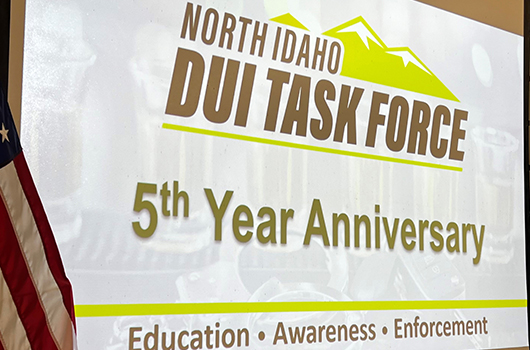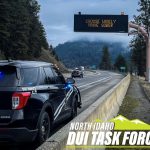North Idaho is a special place – pristine lakes, snowcapped mountains, and lush forests make it a destination for thrill seekers and those who love the outdoors. Fine restaurants, spas, and resorts bring in tourists and celebrities from around the world. Rugged refinement makes Idaho’s Panhandle one of the most unique places to live or visit in the state.
The combination of freedom-loving locals and visitors who come to let their hair down has a definite appeal, but it also has a dark side. In 2017, the biggest city in the region, Coeur d’Alene, was given the designation as the “Drunkest City in Idaho.” All too often, bad decisions in the region’s restaurants, bars, and breweries were turning into bad decisions on its roads.
Over the next two years, two very high-profile tragedies struck the panhandle community. The first came in 2017 when a Kootenai County Sheriff’s Deputy’s son was killed on Interstate 90 after being broadsided by a drunk driver. The second occurred in 2019 when the Allen family was returning home on US-95 when they were struck by a drunk driver. 39-year-old Ryan Allen, who lived a majority of his life confined to a wheelchair after having been paralyzed in a previous DUI crash at the age of 11, was killed. These incidents, coupled with the not-so-glamorous claim of being the booziest community in the state, served as a catalyst for change.
Outraged by the proliferation of overconsumption, flippant disregard for safety and heartbreaking, preventable losses, public safety agencies across northern Idaho banded together to take a collaborative approach to moving the needle on statistics when it came to serious injury and fatality impaired driving crashes in Kootenai County.
Agency leaders from the Idaho State Police, the Kootenai County Sheriff’s Office, and four city police departments responded with the creation of the North Idaho DUI Task Force in 2019. The team’s inaugural enforcement operation kicked off on St. Patrick’s Day weekend and included a public briefing ceremony, local media coverage, and allowed officers the ability to work outside of their primary jurisdictions over the holiday weekend to target saturated enforcement efforts on the highest risk areas like the bar districts in cities across Kootenai County.
Since then, the DUI Task Force has grown to include 15 city, county, state, and tribal law enforcement agencies and has planned and executed similar enforcement operations surrounding major holidays and local events annually over the past five years. In that time, the team also recognized that in order to instigate a cultural shift toward sober driving, they also had to deploy a strategy for targeted education and engagement with the community.
“We realized this wasn’t a problem we were going to arrest our way out of,” said ISP Sergeant Justin Scotch. With that understanding, coupled with a healthy dose of support from the Office of Highway Safety, and armed with Idaho Transportation Department’s District 1 Public Information Officer as a liaison for community outreach, the team has become a buzzworthy presence on social media and at regional community events to engage with the public on the importance of safe decisions and sober driving.
Outreach efforts have built a following of over 4,500 people across all platforms, and in 2024 these outreach efforts consistently reach nearly a quarter million people from around the region.
Recognizing the success of the team’s innovative approach to targeted outreach, OHS has played a key role in supporting ongoing communication efforts by coordinating resources available through grants and partnership with the National Highway Transportation Safety Administration (NHTSA) to fund digital billboards, dynamic messaging signs on highways, electronic jukebox advertisements inside bars, and paid ad campaigns for social media. They also provide grant opportunities to law enforcement agencies that help to supplement overtime costs for additional officers during mobilizations throughout the year targeted not only at impaired driving, but also to enhance enforcement of behaviors like aggressive driving, distracted driving and seat belt use.
When it comes to the metric for measuring the success of this team, it’s difficult to pinpoint based on the theoretical value of the work that they do. No one will ever know who is living among us today because someone made the right choice to not drive impaired. However, when looking at statistics this data would suggest that the ongoing efforts and coordinated outreach by the DUI Task Force has inevitably made a positive impact on the local community and continues to drive behavioral changes.
Since the task force’s inception, District 1 has experienced an overall downward trend in the number of impairment crash deaths, while also experiencing a decrease in the number of DUI arrests being made collectively by police agencies.
Between 2022 and 2023, North Idaho (District 1) experienced an overall 8% increase in the total number of fatality crashes, regardless of the cause. However, during that same timeframe, North Idaho saw a 15% reduction in impairment-related crashes, a 33% reduction in the number of impairment-related fatality crashes, and a 38% reduction in deaths due to impairment related crashes.
While the total number of crashes, fatal crashes, and deaths due to impairment related factors was also on the decline across the state from 2022 to 2023, North Idaho experienced a reduction in those numbers at over twice the rate (based on preliminary data from the Office of Highway Safety).
The growing presence of this team, coupled with its apparent success, has caught the eye of other regional public safety entities, not only within Idaho, but in other states. In February, members of ITD and ISP were invited by the Oregon Transportation Department to join forces and provide training in eastern Oregon for regional police, safety and community partners aimed at aiding them in replicating a model of the DUI Task Force of their own.
In its early days, the Task Force was primarily enforcement-based and arrest-focused, but has since recognized the greater value in proactive education to help shape and shift social norms surrounding impaired driving.
“It’s not going to happen overnight, but being relentless in the use of our collective voice to shift social norms is something that’s entirely possible,” said PIO Heather McDaniel. “If you were to tell someone from 30 years ago that one day the thought of smoking in an airport or a restaurant would be completely taboo, they’d laugh in your face,” she said. “But look at us now! That’s the shift in mindset we are trying to create toward impaired driving.”
The saying goes that it takes a village, and over the years this team has learned time and again that holds true! When it comes to saving lives it’s not just law enforcement who is responsible for affecting change. From transportation, corrections, and judicial agencies to the healthcare community, education system, private enterprise, and even you and me, we all play a role in shaping the safety of our future.
By committing to the principles of partnership and taking a collaborative approach to combating the impaired driving epidemic, we are all one step closer to getting there.







